A Personal Tribute by Cheryl Olin
Every American pundit, politician, and journalist has by now published or broadcast their praises of our former president Jimmy Carter. I cannot match their fame and eloquence, but I have done something that most of those famous people haven’t. I have spent many days as part of a relatively small group of ordinary citizens, in an intimate setting in the Carters’ hometown, with no reporters or cameras present.
Here’s how I got to socialize with a former president: beginning in 2014, I was privileged to attend a series of Plains Chautauquas, weekend-long cultural and educational events, each organized around a theme, for which the Carters were the hosts. These events, with no more than 75 or 80 people in attendance, were held yearly (sometimes twice a year) in the tiny town of Plains, and usually met at the small community center. Both the Carters were actively involved in most of the activities, relating their own experiences and leading discussions. Many of the programs divulged details of their own lives, both public and private. These meticulously organized events were implemented by a small team of hometown friends of the Carters, who referred to the former president and first lady as Mr. Jimmy and Miss Rosalynn. I enjoy using those terms also.
In addition to standing at a microphone to address the crowd, Mr. Jimmy often circulated in the room to speak one-on-one to people. Event attendees had communal meals each day and the former president enjoyed stopping by each table, making small talk. He was extremely cordial; talking to him was like chit-chatting with a friendly neighbor. His memory was phenomenal – over the weekend he might not recall every name, but he likely remembered where an attendee lived or their occupation. Miss Rosalynn was friendly, but somewhat shy, and she did not move among the crowd like her husband.
As mentioned, each Chautauqua had its own theme, but no matter what the topic, Mr. Jimmy at some point mentioned the work of the Carter Center. He was tremendously proud of the work done there, rightfully so. The Center’s worldwide efforts promote peace, defend human rights, and work to eradicate preventable diseases. He seemed particularly excited about the fight to eradicate Guinea worm disease, a parasitic infection that causes severe pain and incapacitation for extended periods. When the Carter Center took it on in 1986, an estimated 3.5 million people were afflicted with the disease each year. At every Chautauqua, he announced the number of world-wide cases, and each time the number had shrunk significantly. At the last Chautauqua in 2019, the cases were down to double digits. His goal, he stated then, was to see the eradication of Guinea worm disease in his lifetime. He almost got his wish — the number of cases reported in 2024 was seven.
Jimmy Carter is widely seen as a kind, grandfatherly figure, but I have witnessed some flashes of, perhaps not temper, but surely impatience when a situation did not meet expectations. In the Sunday School classes which he famously taught for decades, his routine was to ask visitors to identify their home states. He gave explicit instructions on exactly when and how to respond, and if someone was inattentive and didn’t reply correctly, he didn’t hesitate to say, “You didn’t follow directions.” I have seen displeasure in his face when chairs on the stage were not arranged to specifications, and I’ve seen Secret Service agents leap to correct the problem. It was obvious that nobody wanted to tick off Jimmy Carter.
One of his lifelong friends told me that he was accustomed to giving orders and seeing them followed without hesitation, and he could be rather prickly. In one of his books, Mr. Jimmy relates his service under Admiral Hyman Rickover, who was renowned as a strict taskmaster, and Carter’s fear of disappointing him. He also was brought up by demanding parents, as revealed in some of his books. I highly recommend “An Hour Before Daylight,” his account of his childhood.
There have been no Chautauquas since 2019. The covid virus, of course, eliminated any thought of having such a gathering in 2020, but those of us present at the 2019 event were aware that it might be the last. It was clear that both the Carters were physically frail and Miss Rosalynn was noticeably forgetful; however, Mr. Jimmy remained mentally sharp as ever. After the pandemic, the Carters never made another public appearance, except a drive-by at a Peanut Festival in downtown Plains.
I am grateful to have had the opportunity to see and interact with this immensely important figure of American history.
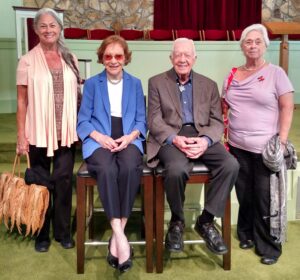
The author and her late sister, Cassandra Flowers, pose with the Carters following Sunday School class.
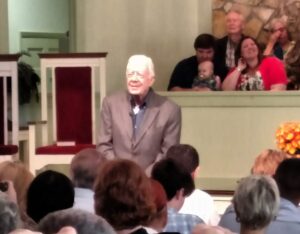
President Carter taught his Sunday School lessons in the sanctuary of Maranatha Baptist Church in Plains. There was always a full house plus an overflow room with video screens.
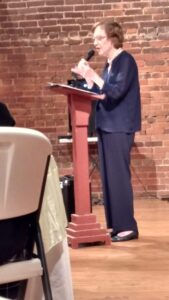
Rosalynn Carter spoke at the Chautauquas on many topics, some of them personal. She was quite forthcoming about her reluctance to leave her life as a Navy officer’s wife to return to Plains, GA. She revealed that once her husband was President, her frequent questions or objections to his decisions resulted in his including her in Cabinet meetings so that she could fully understand those decisions.
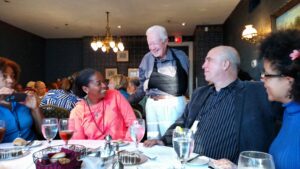
Jimmy Carter loved to chat with Chautauqua attendees, even with a broken arm.
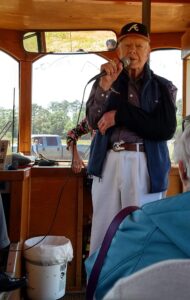
On a Chautauqua field trip to see the solar farm on the Carters’ property, the former president surprised us by meeting our bus and answering questions.